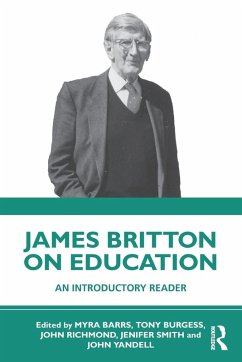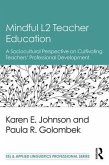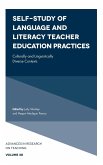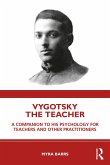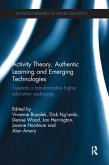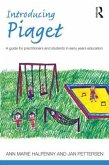James Britton on Education
An Introductory Reader
Herausgeber: Barrs, Myra; Richmond, John; Burgess, Tony
James Britton on Education
An Introductory Reader
Herausgeber: Barrs, Myra; Richmond, John; Burgess, Tony
- Broschiertes Buch
- Merkliste
- Auf die Merkliste
- Bewerten Bewerten
- Teilen
- Produkt teilen
- Produkterinnerung
- Produkterinnerung
James Brittonâ s work addresses central educational questions that are as relevant today as they were half a century ago. This carefully curated collection of Brittonâ s key writings renders his work accessible to todayâ s students, educators and researchers.
Andere Kunden interessierten sich auch für
![Mindful L2 Teacher Education Mindful L2 Teacher Education]() Karen E. JohnsonMindful L2 Teacher Education53,99 €
Karen E. JohnsonMindful L2 Teacher Education53,99 €![Self-Study of Language and Literacy Teacher Education Practices Self-Study of Language and Literacy Teacher Education Practices]() Self-Study of Language and Literacy Teacher Education Practices144,99 €
Self-Study of Language and Literacy Teacher Education Practices144,99 €![Vygotsky the Teacher Vygotsky the Teacher]() Myra BarrsVygotsky the Teacher31,99 €
Myra BarrsVygotsky the Teacher31,99 €![Activity Theory, Authentic Learning and Emerging Technologies Activity Theory, Authentic Learning and Emerging Technologies]() Activity Theory, Authentic Learning and Emerging Technologies66,99 €
Activity Theory, Authentic Learning and Emerging Technologies66,99 €![Language and Literacy Education of Asylum Seekers and Refugees Language and Literacy Education of Asylum Seekers and Refugees]() Azlin Zaiti Zainal (Malaysia Universiti Malaya)Language and Literacy Education of Asylum Seekers and Refugees67,99 €
Azlin Zaiti Zainal (Malaysia Universiti Malaya)Language and Literacy Education of Asylum Seekers and Refugees67,99 €![Effective Use of Collective Peer Teaching in Teacher Education Effective Use of Collective Peer Teaching in Teacher Education]() Rolf K Baltzersen (Norway Oslo Metropolitan University)Effective Use of Collective Peer Teaching in Teacher Education29,99 €
Rolf K Baltzersen (Norway Oslo Metropolitan University)Effective Use of Collective Peer Teaching in Teacher Education29,99 €![Introducing Piaget Introducing Piaget]() Ann Marie HalpennyIntroducing Piaget41,99 €
Ann Marie HalpennyIntroducing Piaget41,99 €-
-
-
James Brittonâ s work addresses central educational questions that are as relevant today as they were half a century ago. This carefully curated collection of Brittonâ s key writings renders his work accessible to todayâ s students, educators and researchers.
Produktdetails
- Produktdetails
- Verlag: Taylor & Francis Ltd
- Seitenzahl: 230
- Erscheinungstermin: 27. Dezember 2024
- Englisch
- Abmessung: 234mm x 156mm x 13mm
- Gewicht: 362g
- ISBN-13: 9781032874852
- ISBN-10: 1032874856
- Artikelnr.: 71612677
- Herstellerkennzeichnung
- Libri GmbH
- Europaallee 1
- 36244 Bad Hersfeld
- gpsr@libri.de
- Verlag: Taylor & Francis Ltd
- Seitenzahl: 230
- Erscheinungstermin: 27. Dezember 2024
- Englisch
- Abmessung: 234mm x 156mm x 13mm
- Gewicht: 362g
- ISBN-13: 9781032874852
- ISBN-10: 1032874856
- Artikelnr.: 71612677
- Herstellerkennzeichnung
- Libri GmbH
- Europaallee 1
- 36244 Bad Hersfeld
- gpsr@libri.de
Myra Barrs was Honorary Senior Research Associate at the UCL Institute of Education, UK, and former director of the Centre for Literacy in Primary Education. Tony Burgess has been a secondary-school teacher, before working in research and teacher education at the UCL Institute of Education, UK. John Richmond has been an English teacher, an adviser of teachers and an educational broadcaster. Jenifer Smith has been an English and drama teacher in both primary and secondary schools, before becoming a teacher educator at the University of East Anglia, UK. John Yandell taught in secondary schools for 20 years before moving to the UCL Institute of Education, UK, where he is Professor of English in Education.
Introduction - James Britton's life and work
Section 1 The language of young children
1.1 The development of language: 'Learning to speak'
1.2 Early literacy: 'Young fluent writers'
1.3 Meaning-making, interaction and play: 'The anatomy of human experience
- the role of inner speech'
Section 2 Language and learning at school
2.1 The value of talk: 'Now that you go to school'
2.2 'Language and learning'
2.3 In defence of 'progressive' practice: 'Language in the British primary
school'
2.4 The disorderliness of learning: from 'Talking to learn'
Section 3 Writing
3.1 Expressive writing: 'Writing to learn and learning to write'
3.2 Functions and audiences in the development of writing: from The
development of writing abilities (11-18)
3.3 What writers have in common: 'Shaping at the point of utterance'
Section 4 Teachers and research
4.1 'A note on teaching, research and "development"'
4.2. 'A quiet form of research'
4.3 The community of the classroom: 'Vygotsky's contribution to pedagogical
theory'
Section 5 A certain idea of English
5.1 The scope of English: 'What is English?'
5.2 'Literature in its place'
5.3 Autobiographical coda: 'English teaching: retrospect and prospect'
5.4 Today's student teachers reading and discussing Britton
Section 1 The language of young children
1.1 The development of language: 'Learning to speak'
1.2 Early literacy: 'Young fluent writers'
1.3 Meaning-making, interaction and play: 'The anatomy of human experience
- the role of inner speech'
Section 2 Language and learning at school
2.1 The value of talk: 'Now that you go to school'
2.2 'Language and learning'
2.3 In defence of 'progressive' practice: 'Language in the British primary
school'
2.4 The disorderliness of learning: from 'Talking to learn'
Section 3 Writing
3.1 Expressive writing: 'Writing to learn and learning to write'
3.2 Functions and audiences in the development of writing: from The
development of writing abilities (11-18)
3.3 What writers have in common: 'Shaping at the point of utterance'
Section 4 Teachers and research
4.1 'A note on teaching, research and "development"'
4.2. 'A quiet form of research'
4.3 The community of the classroom: 'Vygotsky's contribution to pedagogical
theory'
Section 5 A certain idea of English
5.1 The scope of English: 'What is English?'
5.2 'Literature in its place'
5.3 Autobiographical coda: 'English teaching: retrospect and prospect'
5.4 Today's student teachers reading and discussing Britton
Introduction - James Britton's life and work
Section 1 The language of young children
1.1 The development of language: 'Learning to speak'
1.2 Early literacy: 'Young fluent writers'
1.3 Meaning-making, interaction and play: 'The anatomy of human experience
- the role of inner speech'
Section 2 Language and learning at school
2.1 The value of talk: 'Now that you go to school'
2.2 'Language and learning'
2.3 In defence of 'progressive' practice: 'Language in the British primary
school'
2.4 The disorderliness of learning: from 'Talking to learn'
Section 3 Writing
3.1 Expressive writing: 'Writing to learn and learning to write'
3.2 Functions and audiences in the development of writing: from The
development of writing abilities (11-18)
3.3 What writers have in common: 'Shaping at the point of utterance'
Section 4 Teachers and research
4.1 'A note on teaching, research and "development"'
4.2. 'A quiet form of research'
4.3 The community of the classroom: 'Vygotsky's contribution to pedagogical
theory'
Section 5 A certain idea of English
5.1 The scope of English: 'What is English?'
5.2 'Literature in its place'
5.3 Autobiographical coda: 'English teaching: retrospect and prospect'
5.4 Today's student teachers reading and discussing Britton
Section 1 The language of young children
1.1 The development of language: 'Learning to speak'
1.2 Early literacy: 'Young fluent writers'
1.3 Meaning-making, interaction and play: 'The anatomy of human experience
- the role of inner speech'
Section 2 Language and learning at school
2.1 The value of talk: 'Now that you go to school'
2.2 'Language and learning'
2.3 In defence of 'progressive' practice: 'Language in the British primary
school'
2.4 The disorderliness of learning: from 'Talking to learn'
Section 3 Writing
3.1 Expressive writing: 'Writing to learn and learning to write'
3.2 Functions and audiences in the development of writing: from The
development of writing abilities (11-18)
3.3 What writers have in common: 'Shaping at the point of utterance'
Section 4 Teachers and research
4.1 'A note on teaching, research and "development"'
4.2. 'A quiet form of research'
4.3 The community of the classroom: 'Vygotsky's contribution to pedagogical
theory'
Section 5 A certain idea of English
5.1 The scope of English: 'What is English?'
5.2 'Literature in its place'
5.3 Autobiographical coda: 'English teaching: retrospect and prospect'
5.4 Today's student teachers reading and discussing Britton

